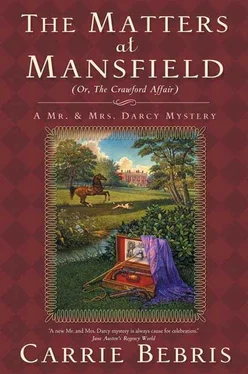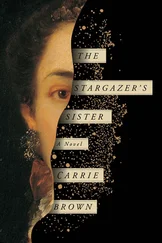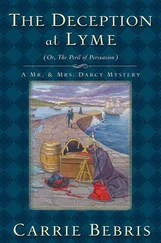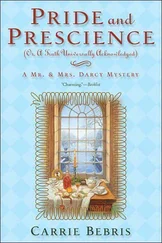Directly they arrived, her ladyship strode into the inn, cast an appraising look about her that pronounced the surroundings altogether inferior, and demanded the whereabouts of Mr. and Mrs. Crawford.
“They are in their room, ma’am,” said the innkeeper. “If you give me your name, I will send one of the girls to announce you.”
“I am Lady Catherine de Bourgh, Mrs. Crawford’s mother. Merely identify which chamber is theirs — on this occasion, I prefer to announce myself.”
The innkeeper complied. Lady Catherine marched up the stairs while Elizabeth lingered behind.
“My husband, Mr. Darcy, has also taken lodging here. Where might I find him?”
“I believe he, too, is presently in his room, across the hall from the Crawfords. Will you be staying?”
“Yes.” She hoped their stay would not prove long. She had sent Lily-Anne home to Pemberley with Mrs. Flaherty and Georgiana, and did not want to be separated from her daughter for an extended period.
He glanced up the staircase. “And her ladyship?”
“She requires accommodations as well — the best available. Have you enough rooms for us all?”
“Certainly. We have only one other guest, a single gentleman, besides your party.”
Elizabeth was pleased to hear that with the exception of a lone gentleman, they had the inn to themselves. Though surely Lady Catherine would exercise discretion in her dealings with Mr. Crawford, the general mood of all their party was not sociable.
She went in search of Darcy and found him standing in the hall, along with Mr. Crawford and Colonel Fitzwilliam.
“Lady Catherine desires a few minutes’ private conversation with her daughter,” Darcy explained. “She also suggested that you see to her room arrangements.”
Elizabeth released a heavy sigh, but it was inadequate to expel the week’s worth of vexation that threatened to well over. She doubted her ladyship’s “suggestion” had been issued as anything resembling a request. Since Mrs. Jenkinson’s dismissal, Lady Catherine had treated her as a replacement attendant, and Elizabeth had acquiesced more often than she was proud to admit — a sinner doing penance for aiding and abetting Anne’s elopement, though within her own mind she yet defended herself against the charge.
“I have already done so on my own initiative,” she said. “Mr. Crawford, how is Anne’s health today?”
“She was feeling much better—”
Lady Catherine’s muffled voice carried through the closed door. Though her words were indistinguishable, her tone clearly communicated the delight she felt upon being reunited with her newlywed daughter.
“—at least, until a few minutes ago.”
Elizabeth pitied Anne. Standing up to Lady Catherine was difficult enough when one could — well, physically stand up. Anne was unused to directly defying her mother, and her injury rendered her all the more defenseless against Lady Catherine’s verbal assault. As much as Elizabeth wished only to enjoy the exclusive company of her husband and the quiet of her own chamber, she felt compelled to lend Anne her support.
“I believe her ladyship has had sufficient time to wish the bride joy.” She rapped on the door.
“You would divert my aunt’s displeasure toward yourself?” Darcy asked. He appeared fatigued, and Elizabeth recalled that, however unpleasant had been her previous se’nnight, his had been worse.
“I merely return it to its natural course. The new Mrs. Crawford may consider the correction her bridal gift.” She knocked a second time, then opened the door without waiting for a response.
Darcy raised his brows at the presumptive tactic.
“It is impossible for me to sink any further in her ladyship’s esteem,” Elizabeth said before entering. “Join me if you dare.”
Anne greeted her arrival with an expression of relief and gratitude; Lady Catherine, with her usual condemning countenance.
“Is there something you require, Mrs. Darcy?”
“If you have done monopolizing her, I would greet the new Mrs. Crawford.”
Before the startled Lady Catherine could intercept her, Elizabeth went to Anne’s bedside. “I understand congratulations are in order. I hope your marriage brings you much felicity, though I was surprised as anybody to learn of it.”
Anne’s face bespoke confusion. “Truly? But you said you knew what I was about. And that I should accept Henry’s offer if it made me happy.”
“I meant his offer to escort you to the dance floor, not to Gretna Green. I had no presentiment of your eloping. But now you are wed, and we”—she looked meaningfully at Lady Catherine, observing as she did so that Darcy and the other gentlemen had also entered the chamber—“ all of us — ought to look forward, not back.”
Lady Catherine’s gaze moved from Elizabeth to Mr. Crawford. It was difficult to determine which of them she held in greater contempt at the moment. “Indeed we must,” she finally declared. “So I would know, Mr. Crawford, how you intend to provide for my daughter. I demand a full reckoning of your worth, because our first order of business will be drawing up the marriage articles your elopement so conveniently avoided. I sincerely hope you did not intend to enhance your income with a bridal settlement from me, for there will be none after the utterly objectionable manner in which you brought about this union.”
Mr. Crawford stepped toward Anne, so as to enter this battle with a united front. Lady Catherine, however, interposed herself. The tactic disconcerted him. For a moment he looked as if he might make a second attempt to reach his wife’s side, but upon further evaluation of his opponent, the errant bridegroom settled for holding his ground.
“I assure you, I am well able to provide for Mrs. Crawford.”
“Anne is accustomed to a certain style of living which must be maintained, both during your lifetime and in the event of your untimely demise.” Her tone suggested that such an event would be considered untimely to only one party of the conversation. “My solicitor has been investigating you and your financial affairs. He will arrive here within a few days’ time to draw up the agreement. Everything from pin money to her widow’s jointure will be specified. I understand you are independent, with property in Norfolk?”
“Indeed. Everingham is a fine estate, and upon coming into possession I made many improvements—”
“It is unencumbered? No entail will prevent Anne or her daughters from inheriting should she bear no sons?”
“Mother!”
“Anne, we must address these matters. They should have been delineated before you wed this man, or any man. You have a fragile constitution. If you predecease your husband, would you have your children left penniless while the son of a second wife inherits everything? If Mr. Crawford dies before you, would you lose your home whilst some remote relation seizes all?”
Though Lady Catherine’s delivery was dramatic, Elizabeth knew all too well that she did not exaggerate the threat that entails posed to women’s security. As Elizabeth had no brothers, upon her father’s death the Bennet family home would go to a distant cousin, leaving her mother and unmarried sister dependent upon the generosity of Mrs. Bennet’s sons-in-law.
“Everingham is unentailed. I may leave it to whomever I wish.”
“What of your spinster sister? Are you responsible for her maintenance?”
Mr. Crawford chuckled. “I would hardly call Mary a spinster. She is still young and I fully expect she will wed, and quite well. But should she not, she inherited a fortune of her own upon our father’s death and can live quite comfortably upon it.”
“Have you other dependents? The estate is not burdened by annuities?”
Читать дальше












